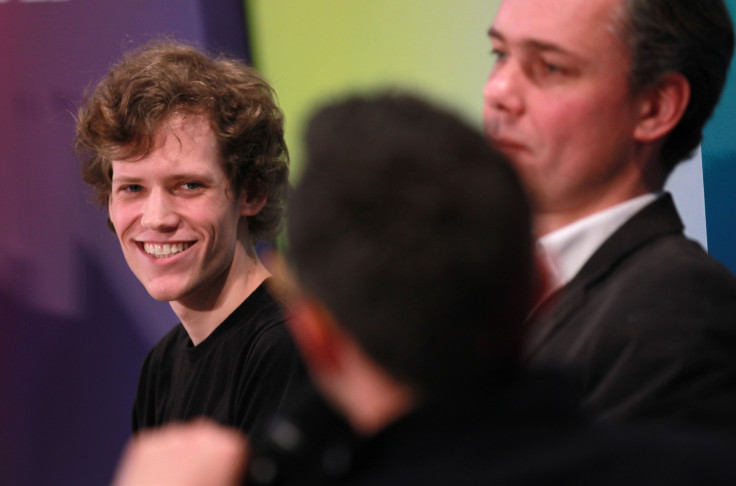Meet 4chan: Home Of Anonymous And The Fappening Resurfaces With Oregon Shooting

Anyone who says “there’s no such thing as bad publicity” doesn’t know 4chan. The online bulletin board has come to personify the Internet’s ugly underside. Worse than rude comments and gross images, though, 4chan has distinguished itself as the website where society's worst tendencies fester and spill over to the rest of the world.
Federal law enforcement officials opened an investigation Thursday into whether the gunman who fatally shot nine people and wounded nine others at Oregon’s Umpqua Community College talked about his plans beforehand on 4chan. The message, posted just after midnight Thursday, stated: “Some of you guys are alright. Don’t go to school tomorrow if you are in the northwest. So long space robots.”
That warning is just the latest black eye that 4chan left on society after giving birth to the “Fappening” celebrity nude photo scandal, Gamergate and other flashpoints.
Wait, What Is 4chan Again?
Christopher Poole, a 15-year-old student, became the first of many teenagers who would access 4Chan from their bedroom when he founded 4chan.org from his New York City home in 2003. It was an outgrowth of Something Awful, a popular comedy website, where Poole encouraged users from a forum called the Anime Death Tentacle Rape Whorehouse to join his new site. He dubbed it 4chan as a tribute to the Japanese image board 2chan, where users congregated to celebrate anime.
As at Reddit and other Internet forums, 4chan users (at last count there were about 22 million) are allowed to post anonymously in threads covering everything from cooking and video games to the paranormal and graphic pornography. The key difference from Reddit is that 4chan users aren’t allowed to select their own user names -- meaning it’s impossible to track the activity of a single user, and every post, no matter who it’s from, appears to have been posted by “Anonymous.”
A voluntarily user survey in 2010 determined that 56 percent of 4chan users don’t discuss the site when they’re offline, and that 61 percent wouldn’t let their children visit it.
Threads also self-delete after a pre-determined amount of time. Explicit posts expire sooner than G-rated ones, though the ephemeral nature of the site intentionally creates an expectation among users that they’ll never see the same content twice. (Federal officials investigating 4chan’s possible role in the Oregon shootings are examining an archived conversation thread, the New York Times reported.)
Poole announced in September that he sold 4chan to Hiroyuki Nishimura, proprietor of the original 2chan. Terms of the deal weren’t disclosed.
4chan Spawns Hacktivism, And Rickrolling
An astounding number of the Internet’s most popular memes were born in the depths of 4chan. “Rickrolling,” for example, is the name given to the notorious (and still hysterical) bait and switch that occurs when a friend sends you what looks like an interesting link. The link seems normal, until it redirects the victim to the 1987 music video for “Never Gonna Give You Up” by onetime U.K. teen idol Rick Astley.
The joke peaked when the Foo Fighters pulled a real life Rickroll against protesters from the notorious Westboro Baptist Church last month:
Soon after Rickrolling became popular, the Anonymous hacking collective used it as a protest device in their attack on the Church of Scientology in 2008, the group’s first major demonstration.
The still-going hacking collective took its name from the “Anonymous” nature of 4chan’s posting system, where users would joke that each post was from the same person. Anonymous’ first leaders congregated in 4chan’s /b/ discussion forum, a “random image board” where visitors would try to out-shock each other, trade pornography, or both.
By 2008, five years after 4chan was created, users began pushing each other to “do something big.” The Church of Scientology’s attempts to remove parts of an interview with Scientologist Tom Cruise from the Internet proved to be enough of a starting point. The group launched a series of distributed denial-of-service attacks, timed with prank phone calls and other methods of harassment that have since become Anonymous’ trademark methods of disruption.
4chan Is Probably Dudes-Only
The anonymous-by-nature aspect of 4chan makes it impossible to know how many women actually use the site. But, if recent headlines about the site are any indication, the site’s users probably aren’t much different, demographically, from Christopher Poole.
Gamergate came first. A lingering culture of misogyny in the video game world erupted in August 2014, when a female independent game developer, Zoe Quinn, released her own interactive game to mostly positive reviews. A community of gamers alleged that Quinn’s game won praise only because she is a woman who slept with a game critic in exchange for favorable coverage (untrue).
Quinn endured 18 months of harassment and told reporters she had no choice but to leave her home because of the hate campaign, which had its roots on Twitter and 4chan. Tom Mendelsohn, a columnist with the Independent, wrote, “As with most of the worst things on the Internet, this whole palaver can be traced back to the primordial soup-stains 4chan and Reddit, two digital plaguepits of particularly virulent woman-hatred.”
And don’t forget the Fappening (which combines “fap,” slang for masturbation, and the 4chan meme “It’s Happening”). A group of hackers infiltrated dozens’ of (mostly) female celebrities’ iCloud accounts and stole nude pictures, passing them around on a protected area of 4chan before they leaked to the public. Jennifer Lawrence, Kate Upton, Justin Verlander, Kirsten Dunst and a number of other A-list stars confirmed the authenticity of the images.
Another 4chan post later threatened to spread nude pictures of Emma Watson after the “Harry Potter” actress delivered a stirring address on feminism at the United Nations.
© Copyright IBTimes 2025. All rights reserved.




















